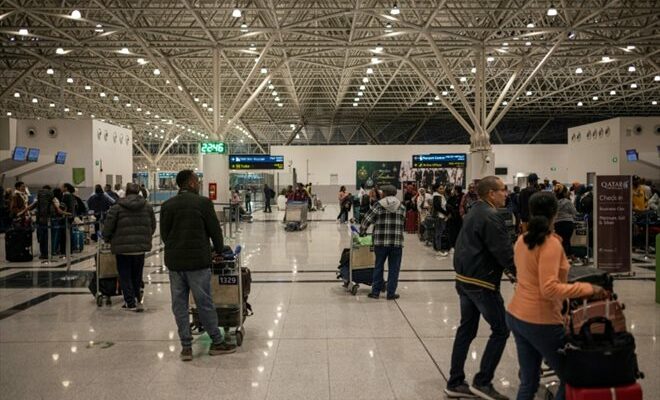A traveler looks at a flight information board at Addis Ababa airport, February 5, 2024 in Ethiopia (AFP/Archives/Michele Spatari)
To travel the 1,000 km between Libreville and Bangui, it takes at best nine hours and 1,000 dollars, one example among others of the expensive path of the cross that is air travel in Africa, due to protectionist policies and taxes high.
In Europe, a Paris-Madrid flight – an equivalent distance – lasts two hours and is five times cheaper.
But unlike Europe, “travel in Africa is very difficult”, laments Moses Munga, a construction consultant met at Nairobi airport, while waiting for his flight to Ghana.
Like him, Ahmed Mekewi travels as part of his work. “I would have difficulty traveling on my own,” confides this 29-year-old Kenyan engineer: “The cost of a trip to Africa is very high.”
Unlike Europe which opened its market in the 1990s, “there is not yet a unified African air market”, explains an expert in the African air sector, who requested anonymity due to his functions.
“In Europe, Air France, for example, can make as many flights as it wants to Germany, Belgium, Spain or Portugal. This freedom (…) does not exist within the “Africa” for African companies, explains this expert, denouncing the parsimony with which certain States grant “traffic rights” allowing them to operate on their territory.
These restricted “traffic rights” limit the number of direct routes and the frequency of flights, and make journeys longer.
According to a study carried out in 2021 by the International Air Transport Association (IATA) for the African Union (AU), of the 1,431 possible connections between each of the 54 AU countries, only 19% benefited from ‘a direct flight at least weekly.
– “Protectionist mechanisms” –
These “protectionist mechanisms” put in place by certain countries “to favor their local companies (…) hinder competition and drive up prices” of tickets, underlines Linden Birns, an airline sector consultant based in South Africa.
As a result, “air traffic is so expensive in Africa that it is not developing and the lines remain poorly served,” laments Guy Leitch, aeronautical analyst and publisher of the South African magazine SA Flyer.

Air travel in Africa is proving expensive and complicated due to protectionist policies and high taxes (AFP/Archives/Simon MAINA)
“Africa is the region (of the world) where air ticket prices are by far the most expensive for travel within the continent,” notes IATA in its study.
In addition to the “restrictions” put in place by States, “the very high taxes” in Africa for the use of air navigation services or airport facilities, but also the high cost of kerosene on the continent, explain the price of travel intra-African air transport, analyzes Robert Lisinge, head of the Energy, Infrastructure and Services Division at the UN Economic Commission for Africa (ECA).
Mostly imported, due to low African refining capacities, kerosene in Africa is “often 30% more expensive than elsewhere, including in the airports of oil-producing countries”, confirms the African expert who requested anonymity.
– Economic gains –
Yamoussoukro decision in 1999 on the liberalization of the air market in Africa, then Single African Air Transport Market (SAATM in English) in 2018… Liberalization projects are struggling to be implemented.

Travelers at Addis Ababa airport, February 5, 2024 in Ethiopia (AFP/Archives/Michele Spatari)
“The idea of SAATM is to lift (the) restrictions,” explains Robert Lisinge: “If you liberalize the market, it will increase the number of (air) connections and bring down costs.”
But “there remain many bilateral agreements relating to air services and many restrictions” which prevent companies from operating “as many flights as they wish, with aircraft of the capacity of their choice”.
Another IATA study from 2014 covering 12 countries (three in each of the continent’s sub-regions) concluded that liberalization of the air market between these countries would increase traffic by 81%.
Removing barriers between these 12 countries would generate $1.3 billion in additional economic activity and help create 155,000 jobs, she concluded.
Current constraints “make business difficult”, confirms Moses Munga, the construction consultant.
“When we have found a client and we establish their quote, we must include the high cost of the trip. (…) Not everyone is able to assume it and we must (sometimes) abandon certain contracts,” he explains.
“Africa is vast, road connections are relatively bad” and rail lines are few in number, recalls Mr. Lisinge, referring to the African Continental Free Trade Area (ZLCAf) project: “Air transport is necessary to transport perishable goods and traders, but also the experts that intra-African trade will need.
burs-ayv/dyg/sva/cpy
© 2024 AFP
Did you like this article ? Share it with your friends using the buttons below.




